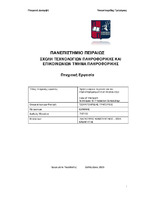Χρήση ευφυών τεχνικών για τον «χρονοπρογραμματισμό παραγωγής»
Use of intelligent techniques for production scheduling

View/
Abstract
This thesis explores the use of intelligent techniques in production scheduling, investigating both theoretical foundations and applications in real industrial environments. The analysis begins with a presentation of traditional scheduling methods, such as Gantt charts and network diagrams, which, although fundamental, present significant limitations, especially under conditions of increased uncertainty and complexity.
It then presents the transition from static approaches to dynamic and flexible methods based on artificial intelligence. These techniques include genetic algorithms, particle swarm optimization, ant colony systems, neural networks, reinforcement learning, and fuzzy logic, offering tools that enhance accuracy, adaptability, and predictive capability. Particular emphasis is given to the integration of intelligent techniques within the framework of Industry 4.0, where digital technologies, the Internet of Things (IoT), and cyber-physical systems play a critical role in the collection and analysis of real-time data. These data allow the adaptation of schedules based on the actual conditions of the factory, leading to more sustainable and efficient production processes.
The thesis also focuses on the practical application of these techniques in various sectors, such as energy, food, automotive industry, and small and medium-sized enterprises. The study presents examples where the use of technologies such as digital twins and their integration with ERP/MES systems have led to measurable benefits, such as reduced production times, improved quality, and minimized waste. Ethical and legal dimensions are also examined, with emphasis on issues of algorithm explainability and transparency, as well as the regulatory framework that should govern the development and implementation of such systems in the industrial sector.
The study concludes by presenting future trends, such as the use of sustainability as a core criterion in scheduling and the development of self-improving systems that can autonomously adapt their strategies. These technologies shape a production landscape that is not only intelligent but also environmentally and socially responsible.
The research demonstrates that intelligent techniques, when combined with appropriate technological infrastructures and regulatory frameworks, can bring about a significant transformation in the way production scheduling is approached. Their successful adoption requires not only technological investment but also organizational restructuring, personnel training, and a strategic perception of innovation as a prerequisite for sustainable development.
This thesis contributes to the existing literature by presenting a comprehensive approach that combines theory and practice, technical analysis, and strategic thinking, thereby enhancing the understanding and application of intelligent techniques in the crucial field of production scheduling.

